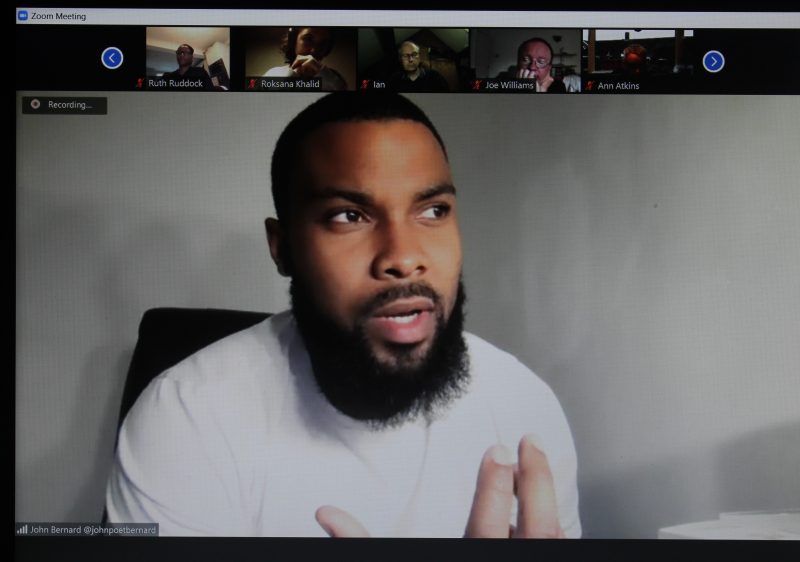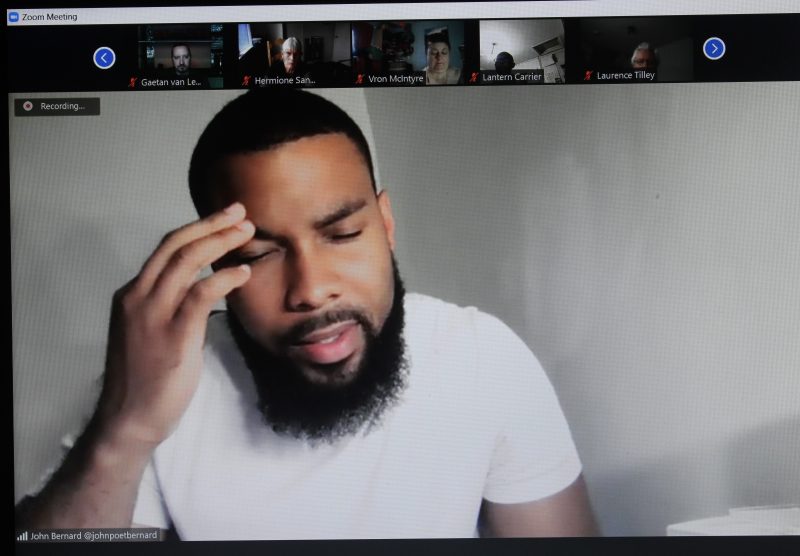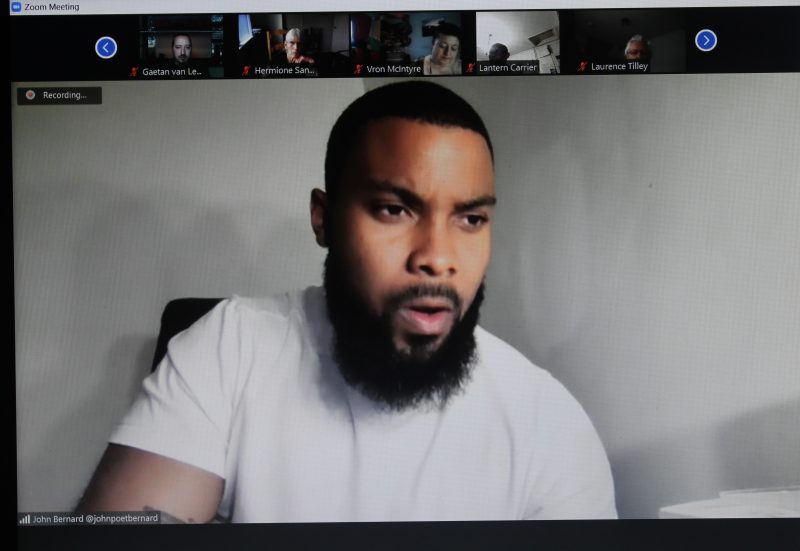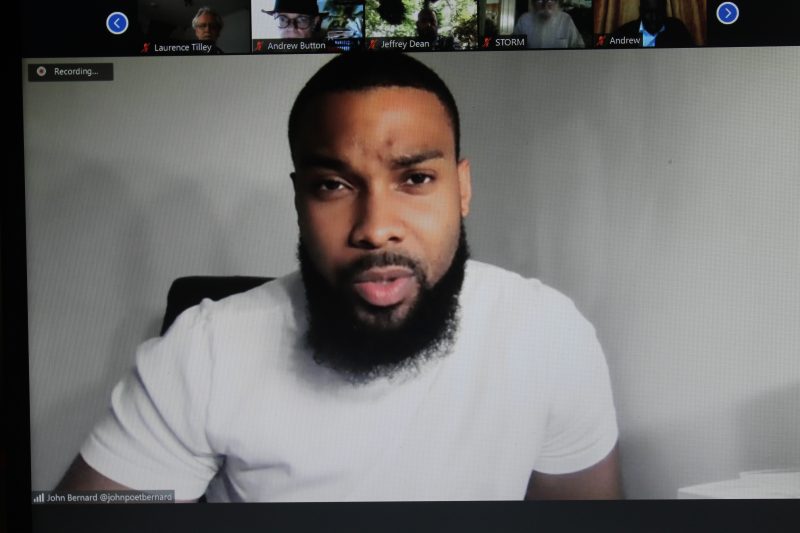INTERVIEW: FIRE & DUST MEETS JOHN BERNARD
John Bernard is a spoken word artist and rapper based in Coventry, whose work commentates on social issues, youth empowerment, faith and purpose. He is the founder of BACE (Be A Change Everywhere), an organisation that helps young people find a medium through poetry and spoken word. John has been commissioned for work by organisations including Apples & Snakes and the BBC (with his poem ‘Loaded Handgun’, written for Black History Month), and was the first local artist to receive £700 from The Herbert Art Gallery & Museum for a digital micro-commission responding to their ‘Thirteen Ways of Looking’ exhibition. He was recently selected as a finalist on 1Xtra and Asian Network’s BBC Words First programme.
On 3rd June 2021, John was the guest headliner at our Fire & Dust poetry night. Two days later, he was one of the six key artists leading Coventry’s UK City of Culture launch event, representing ‘youthfulness’. We caught up with John after the gig, to ask a few questions…
HCE: Tell us a little about your background and journey as a writer so far. What first inspired you to get into creating rap and poetry?
JB: What inspired me to get into poetry and rap was my mum! She realized that I gravitated towards performing arts from a young age so she created an atmosphere in our house that was conducive to me pursuing this vision. After losing her at a young age, the writing became a form of therapy and a way to honour her love and dedication for me.
HCE: Who is your work aimed at – do you have an ideal audience in mind when you’re putting a poem or track together?
JB: Yes, most definitely. My vision has always been to represent those who have come from difficult situations. I want those who feel voiceless to be encouraged to seek their voice when they hear me. I always say that I stand for the orphans, the kids from the estate, the kids who didn’t do well in school, the marginalised, the working class and those who found security in their gifts.

HCE: Big question, but…where would you say is the line between a piece of performance being ‘rap’ or ‘poetry’? Or are they always the same thing?
JB: That is a big question! My mentor said to me what separates any art is the intention. If I am intending to write a rap, then whether it has a beat or it’s acapella then it’s a rap. However, if my intentions behind a piece of writing is to write a poem; then it’s a poem. If this doesn’t make sense then blame John Berkavitch, it made a lot of sense when he first said it!
HCE: How does it feel to be getting positive recognition from platforms like BBC Radio and UK City of Culture 2021?
JB: It feels great. I am always grateful for each milestone. The city has given me so much and for me to be able to represent my city in a positive way is always a blessing.
HCE: Your poetry strikes us as being politically and socially relevant, with a focus on lived experiences for people of colour in particular. Are you aiming to educate audiences through your writing, or do you see it mostly as a form of self-expression?
JB: As water reflects the face, I feel like an artist should reflect their art. I can only give what I know, and I can only commentate from personal experiences and the experiences of those around me. If it comes across as educational then it’s hit a receptive heart and if it’s received as just good or decent art then that’s also fine. My intention is to always have a message, the interpretation is up to the reader or the listener.

HCE: What would you say is the best accident or unplanned event that has helped your writing/writing process?
JB: It may sound weird but probably stopping at traffic lights. I am always thinking, and ideas are constantly bombarding my mind. Most of the stuff that I have written has come from my car journeys; whereby I have stopped at a traffic and a thought has come to me and I quickly must voice note it.
In what ways do you think growing up in Coventry has shaped your experiences and writing?
JB: Probably in all ways. My experiences growing up in the Aldermoor have shaped the way I view a lot of things. The whole sense of community and neighbours looking after each other, these are the things that I saw growing up. Also witnessing the dark side of violent altercations, drug/alcohol abuse, domestic violence really pushed me to express more in writing and in music.

HCE: Do you engage with a lot of poetry and rap yourself? And who are your biggest poetic influences?
JB: The biggest poetic influences for me are Langston Hughes, Benjamin Zephaniah, Lemm Sissay, George the Poet, Polarbear, Kae Tempest, Ezekiel Azonwu, Janette…ikz, John Berkavitch, Hussain Munawar.
HCE: Can you offer any tips or advice for aspiring spoken word artists? What do you think are the most important elements for creating an effective piece of spoken word?
JB: My humble advice will be to write from the heart, recite with heart and let your art reflect your heart. Look at those who have come before you, acquaint yourself with their work and find your own style. You can’t reinvent the wheel, but you can add a bit of colour to the tread.
HCE: It’s not a simple question to ask or answer in 2021, but…what is next on the horizon for you? Are you already working on projects/booked for upcoming performances?
JB: It is difficult to forecast what is next due to the current climate. However, I have a few performances booked throughout the year: Manchester international festival, Flocktogther event and a few others that I am not sure I can talk about yet haha. I am currently working on a school tour for September, we have already secured quite a few schools in the city and are looking to secure more to have the whole of September covered, Lord willing. Aside from that, I am back to releasing more poetry and music videos.

HCE: What’s the best way for people to keep connected or contact you for bookings?
